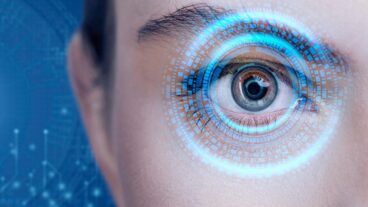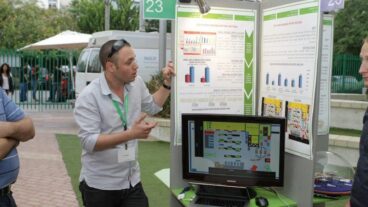According to Se-cure, Tofupill provides an effective and safe alternative to hormone replacement therapy.Looking to the Far East for inspiration, an Israeli company says it has developed a natural soya-based diet supplement that not only helps women overcome menopausal symptoms but also increases bone density.
According to the findings of a study conducted at Tel Hashomer-Sheba Hospital near Tel Aviv, and recently presented at a medical conference in the U.S, among the 37 women who used the soy supplement Tofupill developed by Se-cure Pharmecuticals and Cosmetics in Yavneh, 75 percent reported relief from hot flashes. Tests showed they also experienced a measurable increase in bone density-up to 4 percent in the spine and 2.9 percent in the neck.
“Tofupill is a completely unique product, because it safely treats both osteoperosis and menopause,” Tamar Barkan, the marketing director of Se-cure told ISRAEL21c. The company has just signed a distribution agreement in the U.S., and Tofupill should available as an over-the-counter product this summer, she added.
More than one third of the women in the United States, about 36 million, have been through menopause. With a life expectancy of about 81 years, a 50-year-old woman can expect to live more than one third of her life after menopause.
Estrogen has a number of benefits that can be lost when levels drop too low. For much of their adult lives, women have a lower risk of heart disease than men the same age. However, once a woman reaches menopause and her estrogen levels fall, her prevalence of CVD rises to equal and finally surpass that of men.
The risk of osteoporosis in women also rises as estrogen levels decrease, both during perimenopause and following menopause. Without estrogen’s protective effects, the rate of bone loss is increased; it is highest during the first five to seven years after menopause.
In traditional medicine, doctors recommend hormone replacement therapy (HRT) to alleviate the discomforts resulting from the dropping levels of estrogen. Synthetic estrogen would be prescribed to halt the decrease of bone mass density and avoid vasomotor and psychological disturbances. However, prolonged HRT can lead to increased risk in the development of breast cancer and thromboembolic results. Because of these life-threatening consequences, about 80 percent of women in their menopausal stage dread to replace estrogen they lose as they grow older for fear of cancer.
A survey of 8,000 women conducted in Scotland indicated that 57 percent of the women responding had experienced one or more menopausal symptoms including hot flashes, disorientation and dizziness. However Asian women had a much lower incidence of menopausal symptoms. For example, studies estimated that less than 25 percent of Japanese women and 18 percent of Chinese women complained of hot flashes. These observations led researchers, including Dr. Israel Sholes of Tel Hashomer- Sheba Hospital to investigate the possible effects on menopausal symptoms of dietary factors in Asian cuisines, including soy food consumption.
“The conflicting data on hormone replacement therapy (HRT) has led to an intensive search for alternative treatments,” said Dr. Benjamin Chayen, who presented the Sheba study at the 51st annual meeting of the American College of Obstetricians and Gynecologists (ACOG) in New Orleans last month.
According to a November 2002 A Johns Hopkins Univeristy medical letter, ‘Health After 50’, which addressed “easing through menopause without HRT”, soy appears to be one of the most promising remedies to overcome menopausal discomfort. Soyfoods “contain isoflavones, substances that have weak estrogen-like effects,” the publication said. “According to a report issued by the American College of Obstetricians and Gynecologists,” it said, “soy appears to be among the most promising of these remedies.” The recommendation of soy was based on dietary intake
Tofu is produced from soybeans, which include many nutritional components such as fats, carbohydrates, proteins and fibers. In addition to all these components the soybean also includes Phytoestrogen, a secondary component that is in part created during the process of turning the soy milk into tofu – ‘the soy cheese’. The difference between Soy and Tofu can be compared to the difference between milk and yogurt; both change their chemical structure from their origin and the availability to the body of the derivative is far higher than of its origin.
Each capsule of TofuPill includes a concentration of all 56 components of Phytoestrogen (such as Formononetin, Puerarin, Coumersol, Daidzin, Equol, Daidzein, Genistin, Biochanin, Isoflavone), in the organic compound, as found in its natural form in Tofu. The products are unique in their use of the complete molecular structure of Phytoestrogen through a natural isolation technique, balancing the hormonal system in a safe and natural way.
Phytoestrogen, explained Barkan, has a chemical structure similar to that of the human estrogen; but unlike the synthetic estrogen, phytoestrogen does not encourage cell growth in the breast tissue and in the uterus, which is the primary cause of cancer.
Chaven led a group of Israeli researchers presented the findings of the Tofupill study, which were based on a 12-month study that involved patients, laboratory cell lines and animals In the laboratory tests, the researchers found the soy compound had no negative effects on breast cancer cell lines, indicating it may not share estrogen’s ability to stimulate tumor growth. And in rat studies, the soy appeared to stimulate growth of skeletal tissue without stimulating cell growth in the uterus, as estrogen therapy can do.












